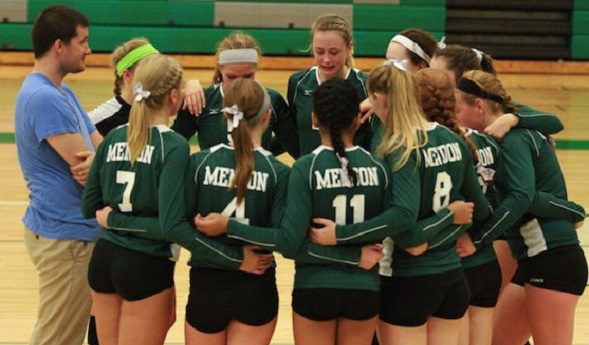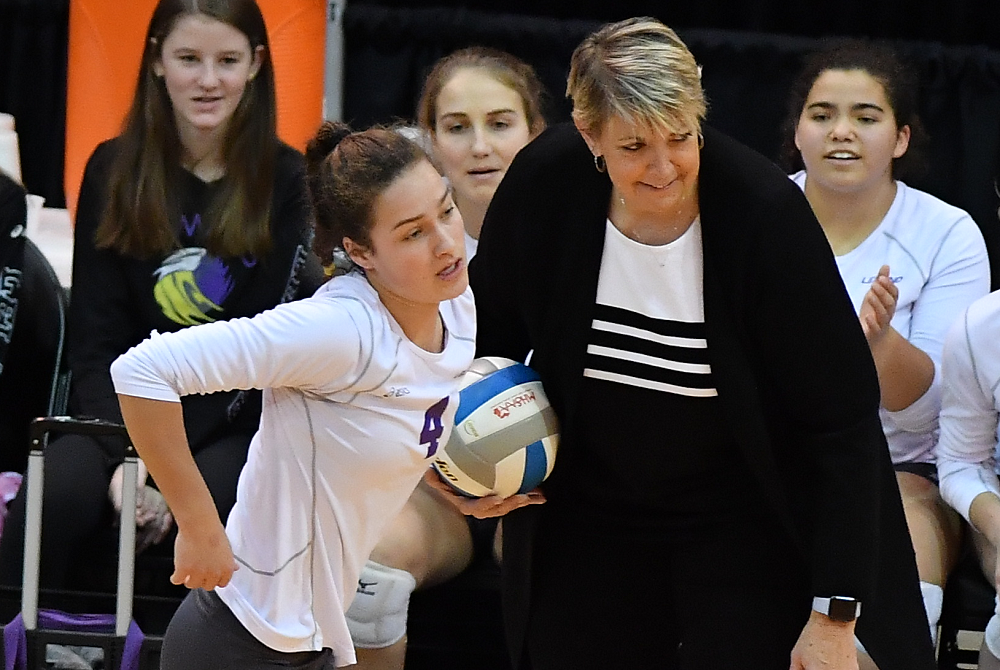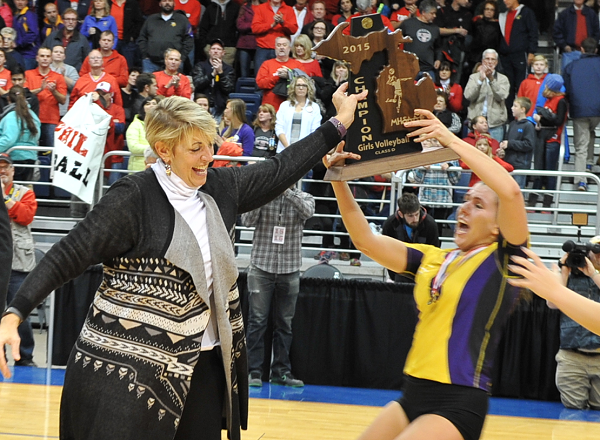
Trenarys Trade Roles, Mendon Reigns On
October 8, 2015
By Wes Morgan
Special for Second Half
Volleyball found Bill Trenary early on. Actually, countless volleyballs did.
“I was getting hit in the head with volleyballs before I could walk,” the Mendon High School varsity coach, now in his second year at the helm, said. “There’s a very good story about me getting knocked out of a walker in this very gym. I started managing when I was in second grade. Ever since then I’ve been in the gym playing volleyball.”
 His mother, Michigan High School Volleyball Coaches Association 2014 Hall of Fame inductee Kathy Trenary, spent more than three decades guiding prep squads, most notably a 19-year run at Mendon that netted 721 victories, 10 conference championships, 15 district titles, six regional crowns, trips to six MHSAA Semifinals and championship victories in 1998, 1999 and 2001.
His mother, Michigan High School Volleyball Coaches Association 2014 Hall of Fame inductee Kathy Trenary, spent more than three decades guiding prep squads, most notably a 19-year run at Mendon that netted 721 victories, 10 conference championships, 15 district titles, six regional crowns, trips to six MHSAA Semifinals and championship victories in 1998, 1999 and 2001.
Growing up around the game undoubtedly sparked Bill Trenary’s interest in the sport. Like most boys, however, he was just as engrossed in other athletic and leisurely pursuits. He enjoyed the outdoors, beating his mother on the squash court and obsessively studying opening chess moves — a competitive fire serving as the common thread.
One unique experience in particular was likely what set Bill Trenary up for a successful career in volleyball.
His parents put a premium on experiencing other cultures. His father, Robert Trenary, was a Fulbright scholar at the University of Botswana when Bill was in the eighth grade. That enabled the Trenary family to live abroad for a year. Bill Trenary ended up setting for his school’s varsity team, which played outdoors under the African sun.
Bill and younger brother Matt went on to play intramural volleyball at the University of Michigan.
“They tried to win the championship but could never do it because a lot of kids on the team just wanted to play,” Kathy Trenary said. “I’d go to Ann Arbor and watch them play. That was great.”
It was about that time when Kathy Trenary took over as head coach at Vicksburg. It was an opportunity for Bill Trenary to fire some high-velocity shots inside high school gyms like those he remembered zipping at him as a toddler.
“I was in my 50s at the time and I said, ‘I really need a hitting boy,” she recalled. “I said, ‘would you like to come and be a hitting boy?’ He really identified with how much he liked (volleyball). He played it all growing up, but he maybe never realized how much he liked it until he started to coach it.
“He just found it fascinating; he has always been a gamer.”
In the years since then, Bill Trenary learned from the best, leading to his takeover of the Mendon program in 2014. Kathy Trenary stayed on as his assistant coach and the continuity was evident with the Hornets’ run to the Class D semifinals in 2014, which ended in a 3-0 loss to Battle Creek St. Philip. The arrangement has been seamless for the Hornets, who are currently ranked No. 6 in the latest MIVCA Class D poll.
 “When we decided to switch, part of the reason was her being kind to me, I guess,” Bill Trenary said. “She saw me getting better. It was time for me to kind of step into that role. I think I’m a little better game coach because I’m younger and I can push through long Saturday tournaments and make the quick decisions on the court.
“When we decided to switch, part of the reason was her being kind to me, I guess,” Bill Trenary said. “She saw me getting better. It was time for me to kind of step into that role. I think I’m a little better game coach because I’m younger and I can push through long Saturday tournaments and make the quick decisions on the court.
“She is absolutely one of the best coaches I’ve ever seen — attention to detail and running practices. She’ll run most of the drills because, heck, she invented most of the drills. Not utilizing her in that role would just be stupid. Me taking that away from her would just cost us points. There’s no reason not to be doing that when we have someone of that caliber.”
A fan of Tom Tango’s book “Playing the Percentages in Baseball,” Bill Trenary strongly believes in analytics and that some statistical aspects of volleyball are often overlooked and undervalued.
As are role players, which there are more of this year than freak athletes. That’s often the case at a small school such as Mendon, where fundamentals help offset height disadvantages.
This year Mendon has a “huge arm” in junior hitter Megann Leighton, exceptional leadership from seniors Brandy DeLeeuw and Emma Eberstein, lockdown play from junior libero Kaley Smith and reliable and consistent setting from junior Cassie Plummer.
“That’s how other teams see us win, but the way we win is when Nancy Steinacker can come and serve a string in our weak rotation,” Bill Trenary pointed out.
The points are in the details.
“We don’t have the best athletes every year, but we have a deep knowledge of the game, which is fun,” he said. “I’ve just tried to build on that. I know we’re using more math, more stats, more film than we have. That’s just a next generation sort of thing, but we’re not trying to reinvent the wheel."
 Wes Morgan has reported for the Kalamazoo Gazette, ESPN and ESPNChicago.com, 247Sports and Blue & Gold Illustrated over the last 12 years and is the publisher of JoeInsider.com. He can be reached at [email protected] with story ideas for Berrien, Cass, St. Joseph and Branch counties.
Wes Morgan has reported for the Kalamazoo Gazette, ESPN and ESPNChicago.com, 247Sports and Blue & Gold Illustrated over the last 12 years and is the publisher of JoeInsider.com. He can be reached at [email protected] with story ideas for Berrien, Cass, St. Joseph and Branch counties.
PHOTOS: (Top) Mendon coach Bill Trenary, far left, huddles with his team during a match this season. (Middle) Mendon assistant Kathy Trenary, left, remains in the program as her son's assistant. (Photos courtesy of Nicci Plummer.)

2023 WISL Award Honoree Glass Continuing to Create Leaders On Court & Off
By
Geoff Kimmerly
MHSAA.com senior editor
March 2, 2023
Hailing from one of Michigan’s smallest communities, Laurie Glass has made an impact that continues to connect all over Michigan.
But her impact on women’s athletics began long before a career that has seen the longtime Leland volleyball coach become one of the winningest in her sport in state history.
As a high school junior in 1976, she recruited seven classmates and a coach to form Leland’s first girls sports team – for basketball – and the same group then played volleyball that winter. She was a senior and major contributor when, during their second season, the Comets won the 1978 Class D volleyball championship.
More than four decades later, Glass is a Michigan legend in that sport – a winner of 1,218 matches with Leland and Traverse City Central and three Finals championships with the Comets. She’s also a nationally-recognized voice in volleyball and women’s athletics as a whole – and this year’s MHSAA Women in Sports Leadership honoree for those many and continuing contributions.
“Because I’m a teacher and coach, that’s my desire to help the youth be the best they could be. And if I can impact a coach or impact another district or program, that means I’m affecting more youth in a positive way,” Glass said. “So for me, it’s just the ripple effect; it gets a lot bigger when I’m starting little drops in other places. So I can affect the hundreds of kids that I’ve seen go through Leland, or I can impact the larger audience by impacting coaches or impacting kids in other places that can then impact other people. It allows me a wider audience for wanting to help young women to be their best young woman self in however way I can make that happen.”
Each year, the Representative Council considers the achievements of women coaches, officials and athletic administrators affiliated with the MHSAA who show exemplary leadership capabilities and positive contributions to athletics.
Leland finished 49-13 this past season and reached the Division 4 Quarterfinals. Glass has a record of 1,218-393-122 over more than three decades as a varsity volleyball coach, having led the Comets for a combined 29 seasons over three tenures, the first beginning with the 1989-90 winter season and later picking up with her most recent return for Fall 2010. She also coached Traverse City Central for four seasons beginning in 1991-92.
 Glass led Leland to Class D Finals championships in 2002, 2006 and 2015, and runner-up finishes in Class D in 2014 and Division 4 in 2018 and 2019. She was named to the Michigan Interscholastic Volleyball Coaches Association (MIVCA) Hall of Fame in 2006, and selected as national Coach of the Year in volleyball in 2014 by the National Federation of State High School Associations (NFHS) Coaches Association. She’s a three-time MIVCA Coach of the Year and was named Michigan High School Coaches Association (MHSCA) Coach of the Year for volleyball in 2015. She also was a finalist for National High School Athletic Coaches Association (NHSACA) national Coach of the Year in 2014.
Glass led Leland to Class D Finals championships in 2002, 2006 and 2015, and runner-up finishes in Class D in 2014 and Division 4 in 2018 and 2019. She was named to the Michigan Interscholastic Volleyball Coaches Association (MIVCA) Hall of Fame in 2006, and selected as national Coach of the Year in volleyball in 2014 by the National Federation of State High School Associations (NFHS) Coaches Association. She’s a three-time MIVCA Coach of the Year and was named Michigan High School Coaches Association (MHSCA) Coach of the Year for volleyball in 2015. She also was a finalist for National High School Athletic Coaches Association (NHSACA) national Coach of the Year in 2014.
Glass has spoken multiple times at the MHSAA Women In Sports Leadership Conference and several times at the MIVCA Coaches Clinic, and among various other engagements was the featured speaker at the Nebraska Athletic Association Coaches Clinic. She will receive the Women In Sports Leadership Award during the MHSAA Division 1 Girls Basketball Final on March 18 at Michigan State University’s Breslin Center.
“Laurie Glass is recognized most on the statewide level for leading one of the most successful volleyball programs in state history. But she is known among her peers most for the way she teaches not only volleyball but life skills to her athletes,” MHSAA Executive Director Mark Uyl said. “Her leadership creates more leaders, be they the athletes who have the opportunity to play for her or the coaches who learn from her and receive her mentorship.”
Glass’ roots are in one of the most accomplished athletic families in Michigan high school history.
Her father Larry Glass coached Northwestern University’s men’s basketball program from 1963-69, and later took over the Leland girls basketball program and led the Comets to a 388-110 record and three straight Class D Finals championships (1980-82) over two tenures from 1977-91 and 2000-05. Laurie’s sister Rebecca McKee played basketball at Leland and Michigan State University, and her brother Michael Glass played basketball at Lansing Community College before also becoming a high school and college coach.
Laurie also coached and parented arguably the most accomplished volleyball player – and perhaps top female athlete across all sports – in Michigan high school history. Her daughter Alisha Glass-Childress graduated from Leland in 2006 with national records for career kills, aces and blocks, and the first two still top those respective lists. Alisha, also an all-state basketball player, went on to star on the volleyball court at Penn State and as the U.S. Olympic team setter in 2016 in helping that team to the bronze medal.
Larry Glass’ lessons still ring true as Laurie passes them on to another generation. One of her favorite sayings from her father was “you can’t take money out of the bank until you put money in” – in essence, a coach can’t expect athletes to accept criticism or a hard ask if that coach first hasn’t invested in them. Another of her dad’s themes involved making sure players learned fundamentals at young ages and improved on them at all levels, whether they won games or not during those early years. As one of his middle school coaches, that stuck with her, and it remains a basic component of her coaching.
“I’ve always said that we compete with teams that are way more athletic, have all the things on paper that should beat us. And the fact that we know how to be a really good team is what allows us to beat people who on paper should be better than us,” Laurie Glass said. “I’ve always valued the time spent on culture and team because that’s the advantage we hold. We’re never going to be the tallest or most talented – Alisha being the anomaly, of course.”
Laurie Glass has served on the MIVCA Executive Board, including as president, and is a member of the MHSCA and American Volleyball Coaches Association (AVCA). Locally, her program annually hosts the Forever Dig Abby match in honor of former player Abby Gross, who died after a fight against cancer in 2015. Proceeds most years go to benefit another community member battling the disease, and this past season went to a fund for efforts related to ovarian cancer.
Glass has served nearly 35 years in education and retired from her duties as a behavior intervention specialist and special education teacher in the Traverse Bay Area Intermediate School District in 2019. She has returned to the school setting, however, and is in her second year as a behavior intervention specialist at Leland.
Glass earned a bachelor’s degree in special education with an endorsement in emotional impairment from Western Michigan University in 1988, and has done master-level coursework in education administration and technology. She also is a certified instructor for the Crisis Prevention Institute. Glass first attended Grand Valley State University and played a season of volleyball before transferring. (NOTE: Glass also coached the Kalamazoo Central varsity for two seasons during the mid-1980s. Those records are unavailable currently but will be added to her overall record when research is complete.)
Past Women In Sports Leadership Award Winners
1990 – Carol Seavoy, L’Anse
1991 – Diane Laffey, Harper Woods
1992 – Patricia Ashby, Scotts
1993 – Jo Lake, Grosse Pointe
1994 – Brenda Gatlin, Detroit
1995 – Jane Bennett, Ann Arbor
1996 – Cheryl Amos-Helmicki, Huntington Woods
1997 – Delores L. Elswick, Detroit
1998 – Karen S. Leinaar, Delton
1999 – Kathy McGee, Flint
2000 – Pat Richardson, Grass Lake
2001 – Suzanne Martin, East Lansing
2002 – Susan Barthold, Kentwood
2003 – Nancy Clark, Flint
2004 – Kathy Vruggink Westdorp, Grand Rapids
2005 – Barbara Redding, Capac
2006 – Melanie Miller, Lansing
2007 – Jan Sander, Warren Woods
2008 – Jane Bos, Grand Rapids
2009 – Gail Ganakas, Flint; Deb VanKuiken, Holly
2010 – Gina Mazzolini, Lansing
2011 – Ellen Pugh, West Branch; Patti Tibaldi, Traverse City
2012 – Janet Gillette, Comstock Park
2013 – Barbara Beckett, Traverse City
2014 – Teri Reyburn, DeWitt
2015 – Jean LaClair, Bronson
2016 – Betty Wroubel, Pontiac
2017 – Dottie Davis, Ann Arbor
2018 – Meg Seng, Ann Arbor
2019 – Kris Isom, Adrian
2020 – Nikki Norris, East Lansing
2021 – Dorene Ingalls, St. Ignace
2022 – Lori Hyman, Livonia
PHOTOS (Top) Leland coach Laurie Glass confers with one of her players during the 2019 Division 4 Final at Kellogg Arena. (Middle) Glass passes the championship trophy to her team after the Comets won the 2015 Class D title.

